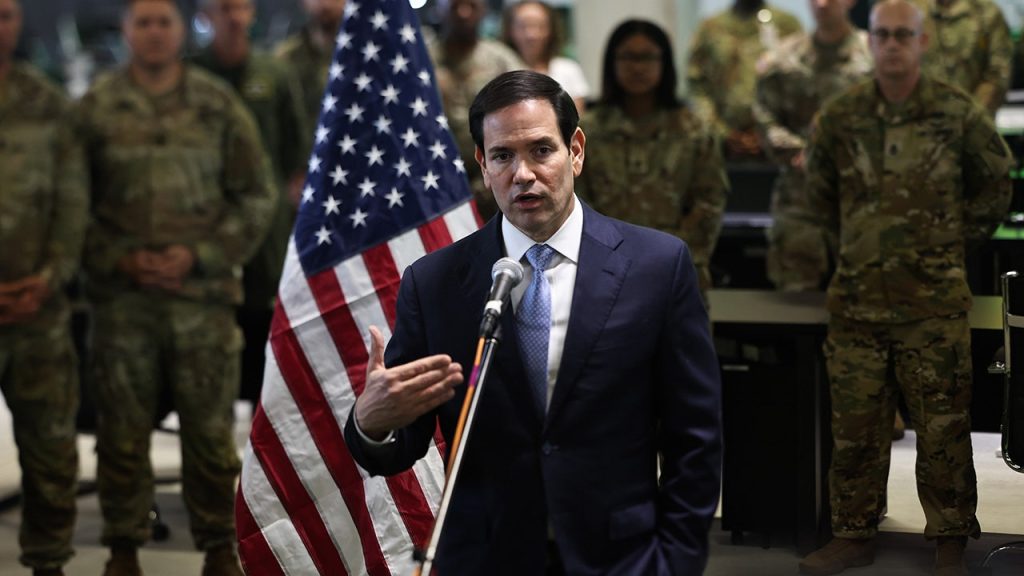U.S. Diplomatic Efforts Strengthen Gaza Peace Deal
In a significant development in Middle East diplomacy, U.S. Secretary of State Marco Rubio revealed that the United States, Israel, and other mediators successfully averted a potential attack last weekend through shared intelligence efforts. Speaking to reporters while traveling from Israel to Qatar, Rubio explained the practical approach being taken to maintain the fragile peace: “We put out a message through State Department, sent it to our mediators as well, about an impending attack, and it didn’t happen. So that’s the goal here, is ultimately to identify a threat before it happens.” This proactive intelligence sharing comes after the State Department had issued warnings about “credible reports” of Hamas planning to violate the agreement with attacks on Palestinian civilians, demonstrating how real-time information exchange between partners has become a cornerstone of maintaining the ceasefire.
The emerging peace framework appears increasingly multinational, with Rubio noting that several countries have expressed interest in contributing to an international stabilization force in Gaza. Qatar, Egypt, and Turkey have been in discussions with the United States, while Indonesia and Azerbaijan have also indicated willingness to participate. However, Rubio highlighted a significant diplomatic hurdle, saying, “Many of the countries who want to be a part of it can’t do it without” formal United Nations support through a resolution. This underscores the complex interplay between regional peace efforts and international institutional frameworks that often determine the feasibility of multinational peacekeeping operations in conflict zones.
The Gaza peace deal has received considerable attention from the highest levels of U.S. leadership, with President Donald Trump meeting Rubio in Qatar before continuing his Asian tour. This high-level engagement follows visits by Vice President JD Vance to Israel earlier in the week, accompanied by special envoy Steve Witkoff and presidential adviser Jared Kushner, Trump’s son-in-law. These coordinated diplomatic efforts by senior officials demonstrate the administration’s commitment to solidifying the ceasefire agreement that took effect earlier this month. Looking ahead, Rubio announced that General Dan Caine, chairman of the Joint Chiefs of Staff, is expected to travel to Israel next week, further emphasizing the military and security dimensions of the peace process.
In Qatar, President Trump expressed gratitude to the country’s leadership for their critical role in facilitating the peace agreement. During meetings with Qatar’s Emir Sheikh Tamim bin Hamad al-Thanimet and Qatar Prime Minister and Foreign Minister Sheikh Mohammed bin Abdulrahman bin Jassim Al Thani, Trump emphasized his vision for lasting regional stability, telling reporters: “This should be an enduring peace.” Qatar has emerged as an essential mediator in the Israeli-Palestinian conflict, using its unique diplomatic positioning to maintain lines of communication with multiple parties, including groups that Western nations often cannot engage with directly. Trump’s acknowledgment of Qatar’s contributions highlights the importance of regional partners in achieving sustainable peace solutions.
The current diplomatic momentum builds upon weeks of intensive negotiations that ultimately led to the implementation of the ceasefire. The agreement, which took effect earlier this month, has provided much-needed relief to civilians in Gaza after months of devastating conflict. However, maintaining this peace requires constant vigilance and coordination between all parties involved. The intelligence sharing that Rubio described represents one practical mechanism through which violations can be prevented before they occur, potentially breaking the cycle of retaliation that has characterized previous failed ceasefires in the region. This approach signals a shift toward preventative measures rather than reactive responses to breaches.
While cautious optimism surrounds the peace deal, significant challenges remain in transitioning from a temporary ceasefire to a durable peace framework. The discussions around an international stabilization force reflect recognition that external support will be necessary to maintain security while addressing the humanitarian crisis in Gaza and beginning reconstruction efforts. The involvement of diverse countries from different regions could potentially provide a balanced approach to peacekeeping, though the requirement for UN authorization presents a potential bottleneck in deployment. As President Trump continues his Asian tour following his Qatar stopover, and with high-ranking American officials maintaining an active presence in the region, the coming weeks will likely prove crucial in determining whether this diplomatic initiative can indeed develop into the “enduring peace” that all parties claim to seek.


